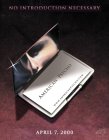
|
American Psycho review
:. Director: Mary Harron
:. Starring: Christian Bale, Justin Theroux
:. Running Time: 1:41
:. Year: 2000
:. Country: USA
|
Adapting American Psycho to the big screen was a perilous task, almost impossible, as Bret Easton Ellis's novel is harsh in its detailed, even surgical representation of violence and sex. Director Mary Harron, however, (I Shot Andy Warhol) carries it out with success, preserving the essence of story while visually toning it down.
For those not familiar with the novel, American Psycho is a satire of New York's Yuppie milieu through the eyes of central character,Patrick Bateman, a high voltage financier by day, serial killer by night. First published in the early nineties Ellis's book casts a cynical look at the previous decade that defined yuppie culture (one recalls Wall Street, a film that already attacked this subject). The extreme use of violence and sex served only as a pretext to show the degradation behind the mask of a generation of business heros, a pedestal of the era.
It's because the director knew to zero in on this point that the film is a success. Instead of inflicting us with a slasher film-and there was certainly enough material to do so—Harron suggests rather than showing in detail, thus avoiding an x-rating. The director concentrates on the character and his interation with the world from which he evolves, using him as a caustic and joyful satire of this Wall Street generation. Bateman is a narcisistic character, in love with himself, literally and figuratively, who aspires to the rank of Perfect Man. But behind his mask of beauty—as the opening scene suggests- hides a monster who attacks those who dishonor his race of Perfect man—beggers, prostitutes, and those like him in whom he finds his own reflection. For this reason only one innocent character of the film will be spared; the only being he could love.
The film oscillates between horror, fantasy, and sarcasm, always under the sign of humor, black of course. Scenes of Bateman's world are hilarious—from the best business card contest among his colleagues to the orgy with prostitutes where he just looks at himself in the mirror while filming the spectacle, finally moving on to the scenes of unreal violence. The critique is aimed to be sharp and spares none, except fpr one. Colleagues, fiancee, lawyers, prostitutes and even the detective: all are gnawed away by vice, desire to be seen, money, perversion, madness, cruelty, and Bateman unites all of these qualities, absorbing them seamlessly. He seems, in fact, to have been chosen to carry out all the sins of this world, a modern Sodom and Gommorah, and the fact that he's not punished for his crimes (whether they're fictitious or not has little importance) has just one goal, as he becomes consciencious he is to be tortured for all the vices of his world.
The film would not work without Christian Bale's interpretation; he gives life to the character, in turn giving the spectator an unexpected exhuberance.It's a treat to watch Bale's performance in such a monstrous role to which he brings a certain goofiness. Serious or crazy, Bale always brings out charm and sweet craziness that make his character hilarious, much like Malcom McDowell in A Clockwork Orange. One remembers the elegant way, like a dance, in which McDowell killed his victims, comparable here to Bateman's quasi philosophical rantings about his favorite singers, like Huey Lewis, Phil Collins, & Whitney Houston—even more ironic given the depth of these singers. The soundtrack moves between bad FM pop and Ellis's new wave classics. Also to be noted is the accurate self effacing manner of Chloe Sevigny who brings a brief moment of freshness and purity.
The lengthy descriptions in the book are absent, except for Bateman's shower soliloquy on personal hygiene. Had the film been faithful to the descriptions it would have lasted several days. One can also question the final scenes with the police, too deliberately fantastic to be honest. Nonetheless what appears awkward is in fact a shrewd lure destined to create confusion in the audience's mind regarding Bateman's mental health. The film blurs easily between reality and fantasy and suddenly offers the viewer, like Bateman, an obvious solution, a sort of easy exit of the nightmare for the character and for the audience. However, in the final scene the sign on the door behind the lawyers and Bateman contains the key to the film. "THIS IS NOT AN EXIT". In a world where appearance reigns the illusions are deceptive. Bateman's lawyer can't tell him apart from his other clients, so how can we be sure of what he says? Lunacy or prison will not be an emergency exit for Bateman who must submit to infinite punishment of cruel reality.
American Psycho unmasks the darkness and the cynicism of 80's America and further succeeds by luring those it targets: its detractors.
Fred Thom

 Movie Reviews: 1998 - 2011 Movie Reviews: 1998 - 2011
 Movie Reviews: 2012 - present Movie Reviews: 2012 - present
|
|


